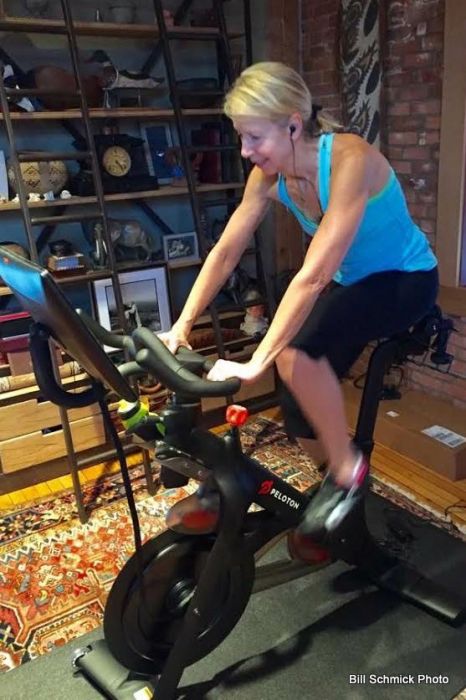| Home | About | Archives | RSS Feed |

The Independent Investor: Gyms Are Counting on Your New Year's resolution

It's that time of the year again when people like me hate people like you. January is the month when all those good intentions to get healthy and fit translate into a 12 percent bump in health club memberships. If only all those Americans who join gyms this month would stick with it.
Sadly for them (but not for me) all those good intentions dissolve by the end of the first quarter. The health clubs of America get back to normal by March. Actually, 4 percent of new members won't make it past the end of January and 14 percent drop out by the end of February. Well over half of new members will fade by the end of the quarter.
The gym owners have no problem with that. They assume that only 18 percent of new members will hang in there and use the gym regularly. You see, the idea of fitness (as opposed to actually doing it), is extremely popular here in America. We all know that, regardless of our good intentions, the population of unhealthy and overweight Americans grows larger all the time. Over 70 percent of Americans are overweight, according to the latest statistics.
That leaves the fitness industry with a practically inexhaustible pool of potential buyers of their services. Statistics for 2016 indicate that worldwide revenues in the health club industry grew to $81 billion. Over 151 million members visited nearly 187,000 clubs. As you might expect, the U.S. leads all markets in club count and represents about 55 million memberships. Brazil and Germany are our runner-ups. But health club memberships are also strong in both the Middle East and in the Asia-Pacific region as well.
Some researchers believe that the health & wellness industry will top $1 trillion at some point soon. Of that total, the lion's share of sales will continue to be in the beauty and anti-aging products sales, followed by fitness and exercise and then eating, nutrition and weight-loss sales. Worldwide, the industry is already clocking in at $3.7 trillion and growth is expected to accelerate by 17 percent in the next five years.
But let's get back to trends in fitness. My gym is what you would call a big box facility — lots of equipment for weight training and cardio. It has a couple of personal trainers, locker rooms and showers and that's about it. Membership dues are $10 a month. You can't beat that, especially when you consider I come from Manhattan where yearly memberships can easily cost you $65-$80 a month for comparable amenities.
High-end clubs, like Equinox in New York City, command a multiple of those prices. Unlike my gym, the beautiful people in high-priced facilities lounge around the pool, check their make-up in the club's nutrition center mirror and, on occasion, perspire, but at an acceptable level.
Yet, smaller niche gyms are also gathering a following. These gyms focus on specialty fitness programs that concentrate on a particular style of exercise, piece of equipment (think Pilates), or even a philosophical approach, such as yoga.
One new twist in this niche market is combining home exercise, while utilizing state-of-the-art internet, and other variables to deliver a customized experience in your living room. This Christmas, as an example, I surprised my wife, who is an avid runner and gym rat, with a subscription plus equipment purchased from a fast-growing, specialty fitness company specializing in spinning.
I reasoned that she needed another cross-sport as an alternative to running. The problem for both of us is that between lifting weights, running, hiking with the dog and other fitness-related activities, we don't have that much spare time available on any given day, thus, a home program that could be done whenever we had the time.
The company, called Peloton, offers an at-home spin class with live instructors accessed via an electronic screen attached to the bike. All classes are recorded in their NYC studio (which Peloton owners call "The Mothership." They also offer an inventory of pre-recorded classes including great simulated bicycle rides through majestic scenery worldwide. Via the internet, the member can socialize with other club members, interact with the trainers, compare notes, and even compete depending upon one's interests.
The membership, spinning bike and accessories were not cheap, but that's what makes me such a great husband. My wife tells me that this company and others like it are growing by leaps and bounds. I don't doubt it.
In any case, even though my gym will be crowded over the next few months, I urge you to join. I am a firm believer in daily exercise and the older you get the more important it becomes. Who knows, maybe we will bump into each other on the elliptical machine and trade stock ideas?
Bill Schmick is registered as an investment adviser representative with Berkshire Money Management. Bill’s forecasts and opinions are purely his own. None of the information presented here should be construed as an endorsement of BMM or a solicitation to become a client of BMM. Direct inquiries to Bill at 1-888-232-6072 (toll free) or email him at Bill@afewdollarsmore.com.

